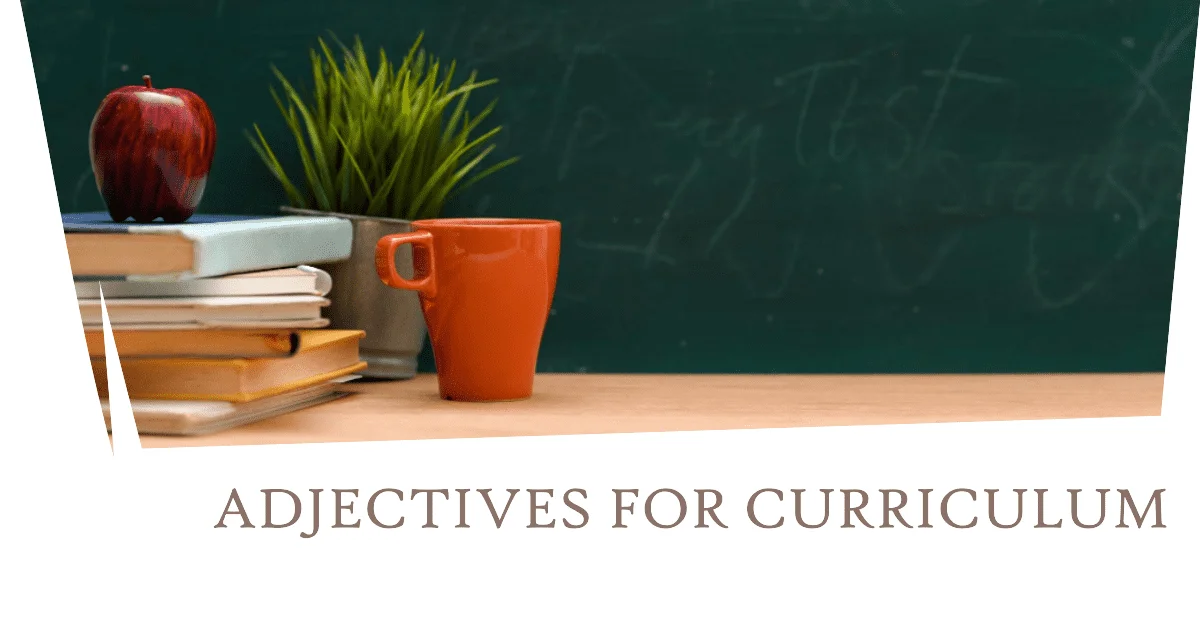Adjectives for Curriculum – List of Words For Curriculum
Curriculum is an important part of any educational system. It is the set of courses, lessons, and activities that students are required to complete in order to gain knowledge and skills. It is important to choose the right adjectives to describe curriculum, as they can help to convey the purpose and value of the curriculum. In this article, we will look at some of the most commonly used adjectives for curriculum.

Adjectives for Curriculum | Positive Words for Curriculum
Comprehensive: Comprehensive means that the curriculum covers a wide range of topics and skills. It is designed to provide students with a thorough understanding of the subject matter.
Flexible: Flexible means that the curriculum can be adapted to meet the needs of different students. It allows for individualized instruction and can be tailored to meet the needs of each student.
Innovative: Innovative means that the curriculum is designed to be creative and forward-thinking. It encourages students to think outside the box and explore new ideas.
Interactive: Interactive means that the curriculum is designed to engage students in the learning process. It encourages students to participate in activities and discussions, and to work together to solve problems.
Relevant: Relevant means that the curriculum is designed to be applicable to the real world. It is designed to help students develop the skills and knowledge they need to be successful in their future careers.
Engaging: Engaging means that the curriculum is designed to be interesting and engaging for students. It encourages students to be actively involved in the learning process and to be curious and excited about the material.
Challenging: Challenging means that the curriculum is designed to push students to their limits. It encourages students to think critically and to strive for excellence.
Competency-Based: Competency-based means that the curriculum is designed to assess students’ knowledge and skills. It is designed to ensure that students are able to demonstrate mastery of the material.
Integrated: Integrated means that the curriculum is designed to be cohesive and interconnected. It encourages students to make connections between different topics and to see how they are related.
Collaborative: Collaborative means that the curriculum is designed to be collaborative. It encourages students to work together to solve problems and to share ideas.
Conclusion
Adjectives are an important part of any curriculum. They can help to convey the purpose and value of the curriculum, and can help to engage students in the learning process. The adjectives listed above are some of the most commonly used adjectives for curriculum, and can help to ensure that students are able to gain the knowledge and skills they need to be successful.
FAQs
What is the purpose of using adjectives for curriculum?
The purpose of using adjectives for curriculum is to convey the purpose and value of the curriculum. Adjectives can help to engage students in the learning process and to ensure that they are able to gain the knowledge and skills they need to be successful.
What are some examples of adjectives for curriculum?
Some examples of adjectives for curriculum include comprehensive, flexible, innovative, interactive, relevant, engaging, challenging, competency-based, integrated, and collaborative.
How can adjectives help to engage students in the learning process?
Adjectives can help to engage students in the learning process by encouraging them to think critically and to be actively involved in the learning process. Adjectives can also help to make the material more interesting and engaging for students.

